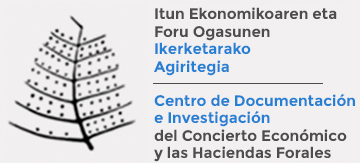The IACFS 2022 Conference will be held on the 27th and 28th of October at the Bizkaia Aretoa in Bilbao, organised by the Ituna Center for Basque Economic Agreement and Fiscal Federalism Studies (UPV/EHU).
The International Association of Center for Federal Studies (IACFS), founded in 1977, is one of the leading international associations for research, dissemination and consultancy on federalism. It currently has more than 30 affiliated centers or institutes on all continents and includes the main federal countries in the world.
The annual IACFS Conference is one of the most important international academic events on federalism. This year’s conference will explore and debate about fiscal federalism, territorial inequalities and the management of subnational public finances.
During the first two decades of the 21st century, we have suffered two severe economic crises: the financial crisis of 2008 and the health crisis of 2020. Both have had a profound impact on the functioning of federal systems and their public finances. The 2008 financial crisis put intense pressure on public accounts and led to an increase in public debt in most federations, with a specific impact on subnational governments and finances, which are responsible for providing basic public services and managing welfare policies. With the 2008 crisis still simmering, the COVID-19 pandemic hit the financial sustainability of public administrations for the second time.
Once the initial impact of the COVID-19 crisis is over, restoring long-term fiscal sustainability and managing public debt will be one of the main challenges for public managers in the coming years. In systems of fiscal federalism, post-crisis public finance and debt management will need to integrate sub-national governments.
Both crises, together with globalisation and processes of technological change, have facilitated the growth of territorial inequalities. This is a major concern in federal countries. The diversity, flexibility and asymmetries of federal institutional frameworks allow systems to adapt to local preferences and needs, but also aim to preserve unity and guarantee certain levels of equity. In this sense, the role of fiscal equalisation mechanisms should be highlighted.
The aim of the conference is to study, compare, project and discuss how the 2008 and COVID-19 crises have affected subnational public finances, the evolution of territorial inequalities and the political and institutional dynamics of the federations.
The conference is open to the public upon REGISTRATION. In addition, the event can be followed live via streaming on the Youtube channel of the Ituna Center and on the Bizkaia Aretoa website.

Program (Download full program)
IACFS 2022 Conference at Bilbao – Fiscal federalism and territorial inequalities
THURSDAY 27 OCTOBER – DAY 1
08:30 Welcome and registration
09:00 Opening ceremony
- Francesco Palermo (President of the IACFS)
- Joseba Agirreazkuenaga (Director of Ituna Center)
- Gemma Martínez (Deputy Director for advising and tax policy of the Provincial Government of Bizkaia)
9:20 Session 1 – Fiscal Federalism, crises and financial imbalances
- Covid 19 and Fiscal Stress: An Analysis of States’ Finances in India – Ajay Kumar Singh (Centre for Federal Studies, Public Policy & Governance)
- Nigeria and the Practice of Federalism in the Post-Covid-19 Period – Dele Babalola (Canterbury Christ Church University)
- Australian Fiscal Federalism From the GFC to COVID-19 – Alan Fenna & John Phillimore (The John Curtin Institute of Public Policy)
- Borrowing to Compete: New Directions in Australian Fiscal Federalism in the Post-Pandemic Context – Tracy Beck Fenwick (Australian Centre for Federalism)
- Discussion
11:00-11:20 Coffee Break
- Long Covid in Public Finance? Lessons from the Covid-19 Pandemic in Germany – Christian Bender & Fabio Botta (Institut für öffentliche Finanzen und Public Management)
- Large Scale But Temporary: How the Federal Government’s Responses to the Great Recession and COVID-19 (Mostly) Maintained Continuity in American Federalism – John Kincaid (Lafayette College) & J. Wesley Leckrone (Widener University).
- Present and future of the decentralisation system in Spain: subnational public finances and interterritorial inequalities – Mikel Erkoreka (Ituna Center), Mario Kölling (UNED / Fundación Manuel Giménez Abad) & Mireia Grau (Institute d´Estudis de l´Autogovern)
- Fiscal decentralization after systemic crises: an analysis of the Brazilian experience – Silvana Gomes (Institute for Applied Economic Research)
- Discussion
15:00 Session 2 – Fiscal Federalism, a tale on diversity
- Fiscal autonomy in multilevel governance: tracing effects on legitimacy and stability – Maja Sahadžić (University of Antwerp)
- Update on Comparative Subnational Constitutional Law – Robert Williams (Center for State Constitutional Studies)
- State constitutions in the American federal republic – Brian Phillips Murphy & Nicholas Cole (Center for State Constitutional Studies & Quill Project, Pembroke College)
- Discussion
16:20-16:40 Coffee Break
- The Italian Constitutional Court decisions and state-regions conflicts in the ‘pendulum of regionalism’: a discontinuity design approach – Andrea Filippetti (Institute for the Study of Regionalism, Federalism and Self-Government)
- Unequal permanent austerity and the distribution of power in the Canadian federation – Olivier Jacques (CREQC-CAPCF)
- Legitimate Representation of Constituent Peoples – from Constitutional Principle to Attempts of its Electoral Denial – Milan Sitarski & Dražen Barbarić (Institute for Social and Political Research Mostar)
- Discussion
18:00 End of the Session 2
FRIDAY 28 OCTOBER – DAY 2
12:40 Ronald Watts Young Researcher Award ceremony
- Borui Song (The Australian National University)
15:00 Session 3 – Equalization, intergovernmental transfers and regional disparities
- Opening:
- Itziar Agirre (Vice-minister of Treasury of the Basque Government)
- An overview of fiscal equalization – Andoni Montes, Jon Garro & Xabier Murua (Ituna Center / UPV/EHU)
- Paving the way to a successful equalization: does subnational participation matters? – Alice Valdesalici & Francisco Romero (Institute for Comparative Federalism – Eurac Research)
- Confronting territorial inequality among South African provinces and municipalities: the limits of fiscal equalisation systems – Nico Steytler, Jaap de Visser & Tinashe Chigwata (Dullah Omar Institute)
- Intergovernmental fiscal transfers, Regional States’ fiscal capacity and the fight against COVID19 pandemic in Ethiopia – Ketema Wakjira Debela (Center for Federalism and Governance Studies)
- Intergovernmental Fiscal Relations during the COVID 19 Pandemic in Germany: Was the new fiscal equalization scheme able to hamper financial dislocations? – Gisela Färber (Deutsches Forschungsinstitut für öffentliche Verwaltung)
- The Fiscal Equivalence Trap – Don’t Decide, Don’t Pay – Eva Maria Belser (Institute of Federalism)
- Discussion
17:00-17:20 Coffee Break
- The Federal Equalization Program as a Controversial and Contested Policy Success – Daniel Béland, André Lecours & Trevor Tombe (Center of Governance at the University of Ottawa)
- Interpersonal and Interregional Redistribution in the Canadian Federation – Alain Noël (Université de Montréal)
- The Power of the Weak? Fiscal Redistribution Negotiations in Canada and the EU – Kinga Koranyi (Jacques Delors Centre)
- Territorial disparities, horizontal imbalances and fiscal federalism in Argentina. New evidences – Miguel Ángel Asensio, Florencia Martino & Pamela Jesica Fadul (UNL-IFANDCSC)
- Fiscal Federalism and Territorial Inequalities: India’s Experience – Govinda Bhattacharjee (Centre for Multilevel Federalism)
- Discussion
19:00 Closing ceremony
- Mikel Erkoreka (Ituna Center)



